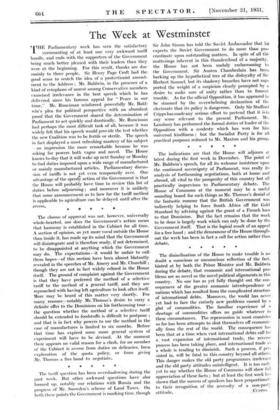The Week at Westminster
/1HE Parliamentary week has seen the satisfactory surmounting of at least one very awkward tariff hurdle, and ends with the supporters of the Government being much better pleased with their leaders than they. were at the beginning. For this result, thanks are due mainly to three people. Sir Henry Page Croft had the- good sense to scotch the idea of a protectionist amend- ment to the Address ; Mr. Baldwin, in the presence of a kind of ectoplasm of unrest among Conservative members exorcised irrelevance in the_ best speech which he has delivered since his famous appeal for " Peace in our time." Mr. Runciman reinforced powerfully Mr. Bald- win's plea for political perspective with an abundant proof that the Government shared the determination of Parliament to act quickly and drastically. Mr. Runciman had perhaps the most difficult task of all, because it was widely felt that his speech would provide the test whether the new Coalition was to be fertile or sterile. The speech in fact displayed a most refreshing mastery of his subject --an impression the more remarkable because he was asking for powers both vague and novel. The House knows to-day that it will wake up next Sunday or Monday to find duties imposed upon a wide range of manufactured or mainly manufactured articles. Parliamentary discus- sion of tariffs is not yet even temporarily over. One advantage of the speedy action of the Government is that the House will probably have time to review this list of duties before adjourning ; and moreover it is unlikely that some announcement as to how far the tariff method is applicable to agriculture can be delayed until after the recess.
































































 Previous page
Previous page